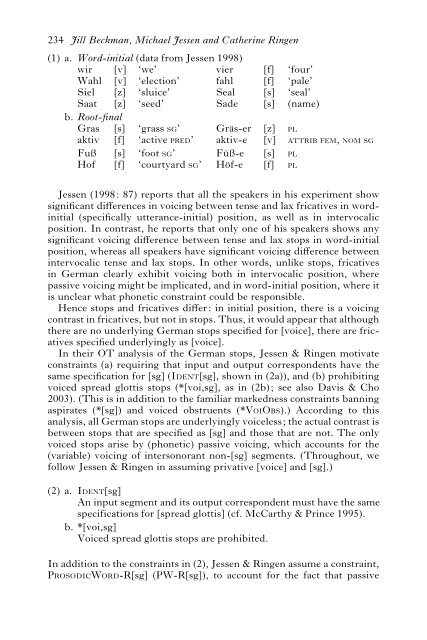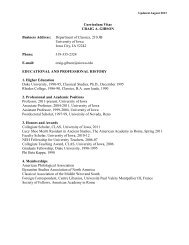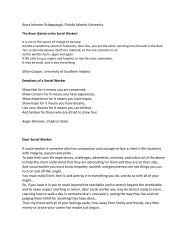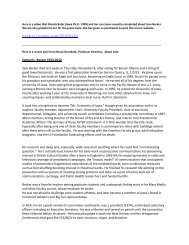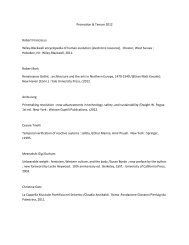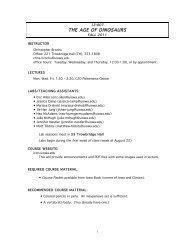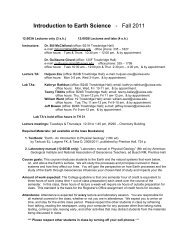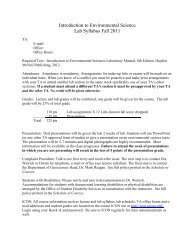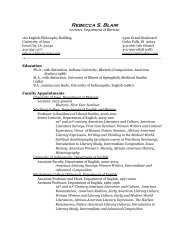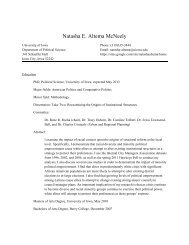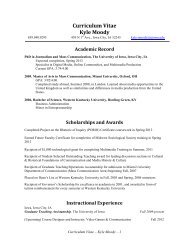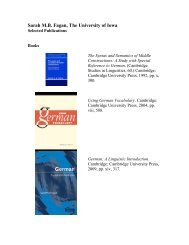German fricatives: coda devoicing or positional faithfulness?
German fricatives: coda devoicing or positional faithfulness?
German fricatives: coda devoicing or positional faithfulness?
Create successful ePaper yourself
Turn your PDF publications into a flip-book with our unique Google optimized e-Paper software.
234 Jill Beckman, Michael Jessen and Catherine Ringen<br />
(1) a. W<strong>or</strong>d-initial (data from Jessen 1998)<br />
wir<br />
Wahl<br />
Siel<br />
Saat<br />
[v]<br />
[v]<br />
[z]<br />
[z]<br />
‘we’<br />
‘election’<br />
‘sluice’<br />
‘seed’<br />
vier<br />
fahl<br />
Seal<br />
Sade<br />
b. Root-final<br />
Gras [s] ‘grass sg’ Gräs-er<br />
aktiv [f] ‘active pred’ aktiv-e<br />
Fuß<br />
Hof<br />
[s]<br />
[f]<br />
‘foot sg’<br />
‘courtyard sg’<br />
Füß-e<br />
Höf-e<br />
[f]<br />
[f]<br />
[s]<br />
[s]<br />
[z]<br />
[v]<br />
[s]<br />
[f]<br />
‘four’<br />
‘pale’<br />
‘seal’<br />
(name)<br />
pl<br />
attrib fem, nom sg<br />
pl<br />
pl<br />
Jessen (1998: 87) rep<strong>or</strong>ts that all the speakers in his experiment show<br />
significant differences in voicing between tense and lax <strong>fricatives</strong> in w<strong>or</strong>dinitial<br />
(specifically utterance-initial) position, as well as in intervocalic<br />
position. In contrast, he rep<strong>or</strong>ts that only one of his speakers shows any<br />
significant voicing difference between tense and lax stops in w<strong>or</strong>d-initial<br />
position, whereas all speakers have significant voicing difference between<br />
intervocalic tense and lax stops. In other w<strong>or</strong>ds, unlike stops, <strong>fricatives</strong><br />
in <strong>German</strong> clearly exhibit voicing both in intervocalic position, where<br />
passive voicing might be implicated, and in w<strong>or</strong>d-initial position, where it<br />
is unclear what phonetic constraint could be responsible.<br />
Hence stops and <strong>fricatives</strong> differ: in initial position, there is a voicing<br />
contrast in <strong>fricatives</strong>, but not in stops. Thus, it would appear that although<br />
there are no underlying <strong>German</strong> stops specified f<strong>or</strong> [voice], there are <strong>fricatives</strong><br />
specified underlyingly as [voice].<br />
In their OT analysis of the <strong>German</strong> stops, Jessen & Ringen motivate<br />
constraints (a) requiring that input and output c<strong>or</strong>respondents have the<br />
same specification f<strong>or</strong> [sg] (IDENT[sg], shown in (2a)), and (b) prohibiting<br />
voiced spread glottis stops (*[voi,sg], as in (2b); see also Davis & Cho<br />
2003). (This is in addition to the familiar markedness constraints banning<br />
aspirates (*[sg]) and voiced obstruents (*VOIOBS).) Acc<strong>or</strong>ding to this<br />
analysis, all <strong>German</strong> stops are underlyingly voiceless; the actual contrast is<br />
between stops that are specified as [sg] and those that are not. The only<br />
voiced stops arise by (phonetic) passive voicing, which accounts f<strong>or</strong> the<br />
(variable) voicing of interson<strong>or</strong>ant non-[sg] segments. (Throughout, we<br />
follow Jessen & Ringen in assuming privative [voice] and [sg].)<br />
(2) a. Ident[sg]<br />
An input segment and its output c<strong>or</strong>respondent must have the same<br />
specifications f<strong>or</strong> [spread glottis] (cf. McCarthy & Prince 1995).<br />
b. *[voi,sg]<br />
Voiced spread glottis stops are prohibited.<br />
In addition to the constraints in (2), Jessen & Ringen assume a constraint,<br />
PROSODICWORD-R[sg] (PW-R[sg]), to account f<strong>or</strong> the fact that passive


